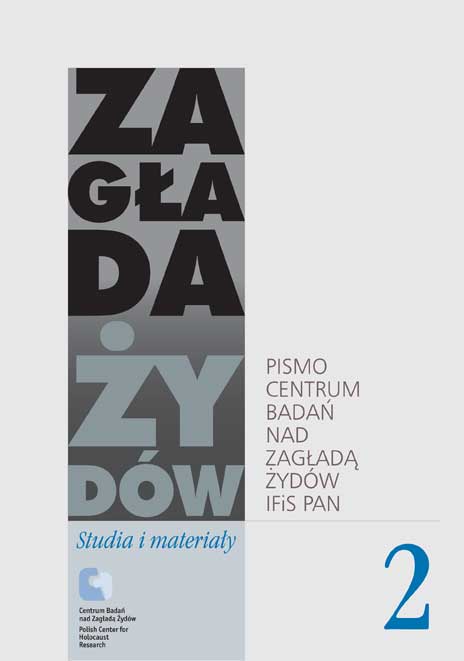Nazi Murder on the Jews in Polish Communist Press (1942–1944)
Zagłada Żydów. Studia i Materiały, No. 2 (2006), Pages: 54-75
Submission Date: 2020-10-11Publication Date: 2006-12-02
 https://doi.org/10.32927/ZZSiM.180
https://doi.org/10.32927/ZZSiM.180
Abstract
Facing the decisive struggle between Nazism and Soviet communism for dominance in Europe, in 1942/43 Polish communists sojourning in the USSR espoused anti-German concepts of the political right. Their aim was an ethnic Polish ‘national communism’. Meanwhile, the Polish Workers’ Party in the occupied country advocated a maximum intensification of civilian resistance and partisan struggle. In this context, commentaries on the Nazi judeocide were an important element in their endeavors to influence the prevailing mood in the country: The underground communist press often pointed to the fate of the murdered Jews as a warning in order to make it clear to the Polish population where a deficient lack of resistance could lead. However, an agreed, unconditional Polish and Jewish armed resistance did not come about.
At the same time, the communist press constantly expanded its demagogic confrontation with Polish “reactionaries” and accused them of shared responsibility for the Nazi murder of the Jews, while the Polish government (in London) was attacked for its failure. This antagonism was intensified in the fierce dispute between the Polish and Soviet governments after the rift which followed revelations about the Katyn massacre. Now the communist propaganda image of the enemy came to the fore in respect to the government and its representatives in occupied Poland. It viewed the government-in-exile as being allied with the “reactionaries,” indifferent to the murder of the Jews, and thus acting ultimately on behalf of Nazi German policy. The communists denounced the real and supposed antisemitism of their adversaries more and more bluntly. In view of their political isolation, they coupled them together, in an undifferentiated manner, extending from the right-wing radical ONR to the social democrats and the other parties represented in the underground parliament loyal to the London based Polish government. Thereby communist propaganda tried to discredit their opponents and to justify the need for a new start in a post-war Poland whose fate should be shaped by the revolutionary left. They were thus paving the way for the ultimate communist takeover
Keywords
Holocaust , Soviets and the Holocaust , Communist press , Katyń , anti-Semitism
License
Copyright (c) 2006 Author&"Holocaust Studies and Materials"

This work is licensed under a Creative Commons Attribution 4.0 International License.
https://creativecommons.org/licenses/by/4.0
The journal is published under the Diamond Open Access Standard, CC-BY-4.0 Deed - Attribution 4.0 International - Creative Commons
Most read articles by the same author(s)
- Klaus Peter Friedrich, Isaiah Trunk, Łódź Ghetto: A History; Andrea Löw, Juden im Getto Litzmannstadt. Lebensbedingungen, Selbstwahrnehmung, Verhalten , Zagłada Żydów. Studia i Materiały: No. 3 (2007)
Similar Articles
- Jacek Leociak, Understanding the Holocaust. A Task for Generations , Zagłada Żydów. Studia i Materiały: 2008: Holocaust Studies and Materials
- Dan Michman, Dutch Society and the Jewish Fate: A Puzzling Record , Zagłada Żydów. Studia i Materiały: No. 12 (2016)
- Jacek Leociak, Marta Tomczok, Affective Holocaust Kitsch – Introduction , Zagłada Żydów. Studia i Materiały: No. 17 (2021)
- Jacek Leociak, Anniversaries of the Warsaw Ghetto Uprising in public discourse (with special reference to the years 1943–1944, 1968 and 2023) , Zagłada Żydów. Studia i Materiały: No. 19 (2023)
- Anna Abakunkova, Contemporary Holocaust Studies in Ukraine , Zagłada Żydów. Studia i Materiały: No. 10 (2014)
- Marta Duch-Dyngosz, Magdalena Waligórska, The Boundaries of Collaboration in the Perception of Court Witnesses of the August Trials , Zagłada Żydów. Studia i Materiały: No. 19 (2023)
- Justyna Kowalska-Leder, The folk history of the Holocaust and the turn to oral history archives , Zagłada Żydów. Studia i Materiały: No. 21 (2025)
- Roni Stauber, Philip Friedman and the Beginning of Holocaust Studies , Zagłada Żydów. Studia i Materiały: No. 11 (2015)
- Adam Kopciowski, Anti-Jewish Incidents in the Lublin Region in the Early Years after World War II , Zagłada Żydów. Studia i Materiały: No. 3 (2007)
- Adam Kopciowski, Anti-Jewish Incidents in the Lublin Region in the Early Years after World War II , Zagłada Żydów. Studia i Materiały: 2008: Holocaust Studies and Materials
1 2 3 4 5 6 7 8 9 10 11 12 13 14 15 16 17 18 19 20 21 22 23 24 25 26 27 28 29 30 31 32 33 34 35 36 37 38 39 40 41 42 43 44 45 46 47 48 49 50 > >>
You may also start an advanced similarity search for this article.
 English
English
 Język Polski
Język Polski








